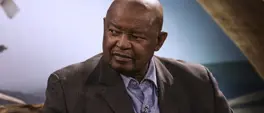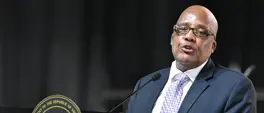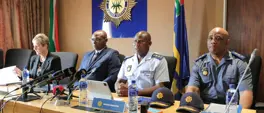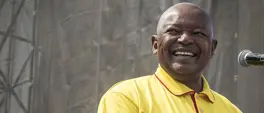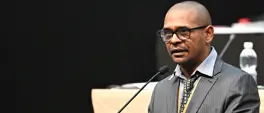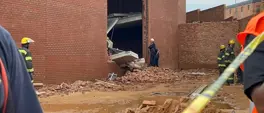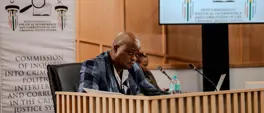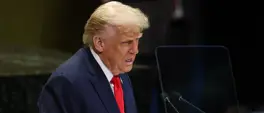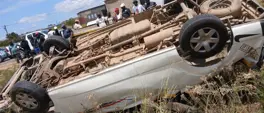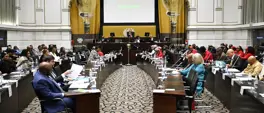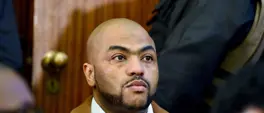CHARLES MATSEKE | The making of Vusi Cat Matlala
Charles Matseke
28 November 2025 | 18:46"Matlala is not simply a criminal before Parliament. He is a mirror held up to a society that failed at scale and is now shocked by the shape of its own reflection."

Vusumuzi 'Cat' Matlala. Picture: Kgomotso Modise/EWN
South Africa loves to study failure in abstractions. We analyse corruption in billions, inequality in coefficients, crime in annual statistics.
But we spend far less time confronting what those numbers do to human beings over time, how policy failure becomes psychology, how inequality hardens into pathology, and how trauma mutates into criminality.
The story of Vusi Cat Matlala, now before Parliament’s ad-hoc committee and the Madlanga Commission, is not merely the biography of a criminal.
It is the biography of a post-apartheid social experiment that broke down in real time.
Matlala was raised by a single mother. He later learned she was a woman living with albinism, who endured multiple sexual assaults.
He grew up without a father figure and was socialised by the streets rather than institutions. This is not to excuse criminality. It is to insist that criminality has a social origin before it becomes a legal problem.
South Africa is quick to demand accountability at the end of the chain, but allergic to accountability at the beginning of it.
We debate service delivery failures, corruption, unemployment and violent crime as separate crises. They are not. They are a single, uninterrupted causal sequence.
The lived reality of deprivation accumulates. Trauma compounds. Abandonment hardens. Over time, the social contract does not merely weaken, it is actively reversed. The state retreats; the street fills the vacuum.
In such an environment, the criminal archetype does not arrive as an anomaly. It arrives as an outcome.
Matlala’s life trajectory mirrors this logic with brutal clarity. The childhood traumas of abandonment, violence and insecurity did not simply vanish with age they crystallised into a personality forged by survival logic.
What emerges years later is not simply a lawbreaker, but what the system itself has trained: a hyper-rational, emotionally insulated operator who treats legality as optional and power as transactional.
In this sense, Matlala is less a rogue actor than a by-product of structural collapse. He is not an interruption in the post-apartheid story, he is one of its most uncomfortable extensions.
This is why the temptation to psychologise him as a uniquely “evil” individual is politically convenient but analytically dishonest. South Africa did not inherit only inequality in 1994; it inherited the full architecture of social engineering that produced it.
Thirty years later, we see the harvest: violence without ideology, wealth without production, power without legitimacy.
The Republic of Commissions thrives on this separation of “facts versus figures versus characters”.
We isolate the individual suspect from the institutional context. We turn syndicates into lone wolves. We strip networks into personalities. In the process, we transform systemic crime into personal deviance.
But the Matlala case resists this reduction. Compared to him, even the Thabo Bester saga begins to feel like a poorly organised sideshow.
ALSO READ: CHARLES MATSEKE | Police inquiry: The uniform is compromised and so is the response
CHARLES MATSEKE | South Africa’s quiet privatisation and the birth of an Oligopoly
Here, we are no longer speaking about a fugitive exploiting correctional failures. We are dealing with systemic criminal integration into the state’s procurement, security and political infrastructure.
Matlala allegedly secured tenders worth hundreds of millions through SAPS, Thembisa Hospital, EMPD and related entities. This is not a story of petty corruption.
It is the story of how Black Economic Empowerment itself has been converted into a mechanism for the reproduction of organised criminal wealth, producing what can only be described as a middle class of criminals complete with property portfolios, family trusts, and intergenerational wealth building through the state as the primary revenue engine.
Here, the state no longer regulates accumulation. It becomes the vehicle of accumulation.
Evenmore disturbing than the tenders are the relationships. Matlala’s proximity to former Police Minister Bheki Cele which he claims included direct payments speaks to something far deeper than individual bribery. It points to the fusion of political authority with criminal industry.
Where this fusion becomes normalised, the security state ceases to function as a protector of society and begins to function as an arbitrator of criminal competition.
His testimony about the violent police raid at his Waterkloof Ridge home in December 2024 armed men storming his bedroom, ordering his family to the floor reveals the schizophrenic nature of the modern South African state.
It is at once captured and coercive, compromised and violent, performing legality while dispensing intimidation.
On day two of the hearings, Matlala went further: alleging drug manufacturing, bribery, missing-persons networks and naming individuals linked to sophisticated criminal machinery.
Yet when questioned about the R360-million SAPS healthcare tender, he invoked his right against self-incrimination.
This contradiction is not incidental. It reveals the structure of the entire spectacle: the commission invites selective disclosure while fencing off the financial nerve centres of the operation.
Most telling, however, is what the ad-hoc committee and the Madlanga Commission have not pursued with adequate urgency the Maumela–Matlala WhatsApp exchanges.
These communications reportedly speak directly to coordination, patronage and protection networks.
Their soft treatment is not an administrative oversight; it is a political decision disguised as procedure.
Who decides which evidence is “followed up” and which is quietly neutralised? Who determines which names become public property and which remain permanently deferred?
And at what point does a commission of inquiry itself become an unwitting mechanism of managed disclosure rather than genuine accountability?
There is a growing sense that Matlala is being repositioned as the central defendant in his own isolated trial detached from the broader ecosystem of political influence, procurementcapture and cartel management of state security.
This is how systems protect themselves: sacrifice the node to preserve the network.
But Matlala’s criminal make-up does not exist in isolation.
It mirrors the broader socio-economic realities of South Africa and much of the developing world: structural unemployment, spatial inequality, educational collapse, masculinity without economic purpose, communities abandoned to survival capitalism.
These conditions do not simply “correlate” with crime; they manufacture the incentives for it.
For three decades, the ANC promised the National Democratic Revolution: redistribution, a developmental state, mass employment, material dignity. Instead, it produced a liberalised economy without industrial depth, a patronage state without developmental capacity, and a security sector increasingly riddled with internal criminal markets.
The result is not merely a country in crisis, it is a country in institutional disarray, where the boundary between public authority and private predation is no longer clearly visible.
In that environment, Matlala’s rise is no longer puzzling. It is logical.
He did not “infiltrate” the state. He grew into the spaces the state itself hollowed out.
This is the deeper danger of the current moment. If the hearings reduce him to a singular villain, South Africa will once again miss the structural diagnosis. The system will congratulate itself on having confronted a monster while continuing to operate the laboratory that produces them.
Matlala is not simply a criminal before Parliament. He is a mirror held up to a society that failed at scale and is now shocked by the shape of its own reflection.
And until South Africa confronts not just who he is, but what made him possible, the next Matlala is not a future risk.
He is already being made.
Charles Matseke (MPhil in Politics and International Relations) is a researcher and writer with a keen interest in contemporary political dynamics. His research focuses on electoral politics, foreign policy analysis, and international relations, with a particular emphasis on the Global South and Africa's role in global affairs.
Get the whole picture 💡
Take a look at the topic timeline for all related articles.
Trending News
More in Opinion
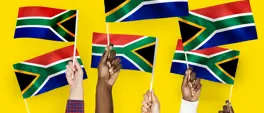
3 March 2026 11:40
Who belongs in South Africa? UCT philosopher weighs in on identity and ownership
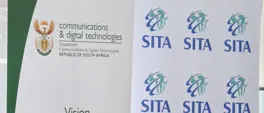
2 March 2026 11:05
TLALI TLALI |Mandate, money and accountability - What the government website debate really reveals

27 February 2026 11:00
JAMIL F. KHAN | Human rights last on the list for global leadership agenda
